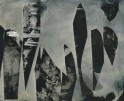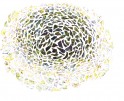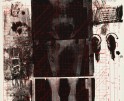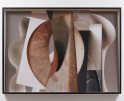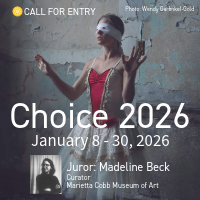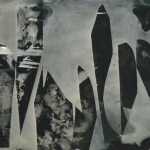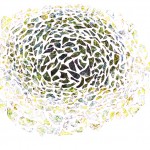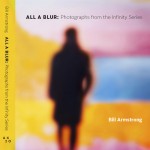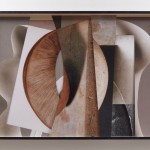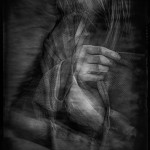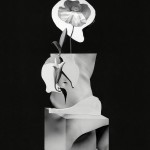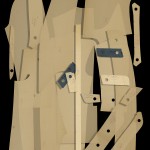Nic Umbs: Memento Vitae
This week, we will be exploring projects inspired by memory, place, and/or intimacy. Today, we’ll be looking at Nic Umbs’s series Memento Vitae.
I first met Nic Umbs at the 2019 Society of Photographic Education Midwest Conference in Milwaukee, WI. Before the world shut down, I was lucky to see his work in person, and it has stuck with me since. Nic’s work explores family, memory, and place through symbolism in both alternative photographic processes and digital art. Memento Vitae explores the way images can be a link to our histories, whether they are our own memories or ancestral experiences. Using his great-grandfather’s camera, Nic reconnected with his own past. I have been following many artists who use archival imagery or historical processes to explore familial histories. The additional layer of distortion visualizes the precarious nature of our memories. Nic’s explorations of these ideas continue to bring questions about our familial experiences to light.
Nic Umbs is an image-maker and educator raised and based near Milwaukee, Wisconsin. He studied at the University of Wisconsin-Milwaukee, attaining his B.S. in biological sciences in 2018 and his M.F.A. in studio arts in 2021. His work uses digital, film, alternative processes, video, and applied scientific/mathematical techniques to solve image-making problems. Within his art practice, his research focuses on interpersonal relationships and the idea of family. He is currently an Adjunct Instructor at UW-Milwaukee and Carroll University.
Follow Nic on Instagram: @nicumbs
Memento Vitae
Photographs within this series were captured in conversation with and using my great grandfather’s Kodak Brownie camera. His camera is damaged due to years of neglect, and therefore introduces light leaks and exposure issues, concealing relevant contextual information. I performed the bare minimum of repairs needed to restore the camera’s operation, like how dysfunctional families tend to fix interpersonal problems just enough that relationships continue working but are not fully mended.
Growing up in my family, I experienced many trials and traumas that left me without a significant connection to my family, my friends, or the world around me. Manifestations of disruptive artifacts within the photographs contort my pseudo-documentation of the family dynamic, magnifying my missing connections and the gaps within the family album. These disruptions mimic the loss of information within a family album; images remain throughout generations, but stories and names often disappear.
Each photograph exists as a fractured memory, breaking the perceived function of the album and emphasizing the lost narratives within; questioning if our thoughts and experiences matter less when we cannot remember every detail. The ethereal and illusory additions show me trying to connect with the world around me – to my past, my present, and my future – sometimes successfully and other times not.
Epiphany Knedler: How did your project come about?
Nic Umbs: In the chaos of my first year of grad school, my grandmother and her siblings were cleaning out part of the attic of the family farmhouse. They found some old photo prints, negatives, and a vintage camera that was stuck shut and inscribed with my great-grandfather’s name. After the thought of throwing them away, my grandmother offered these items to me. In the time it took for her to explain where she found it, I got the camera open, and was purchasing film for it. The few rolls I initially captured had images distorted by the damaged camera, but the camera functioned! Over the next year, I occasionally captured a roll as I explored a few ideas I thought could become my thesis work. I became engrossed in the history of photo albums and the first widely accessible film cameras, leading me to look through dozens of familial archives while documenting my own.
Alongside my uncertainty about how I fit within my family narrative, there was a lot of uncertainty within my program about what a final exhibition would look like, or if my cohort would even get an exhibition due to the pandemic. At the time, I was designing an apparatus that allowed me to capture photos and video digitally through my ancestor’s camera, so, with the exhibition concerns in mind, I created an artist book and short film for alternative viewing options.
A pivotal moment within the series was the second time I photographed my family’s farm using this camera. I had spent a year getting to know the camera, trying to gain control over the damage, and at the time I had recently cut contact with one of the most important and longstanding people in my life. As I photographed my family’s farm, my grandmother, and my father, I truly felt like I was trying to connect to the past, my childhood, and the lives of my family, but that I was failing to adequately and accurately preserve the memory. This was the turning point that pushed me to pursue using my great-grandfather’s camera for a full body of work.
EK: What relationship does memory or intimacy play within your practice, and does photography become a way to navigate these complex topics?
NU: I feel like memory is one of the core elements that emerges in some way throughout all of my work. I am a deeply nostalgic person and in each captured image I feel like I am struggling to chronicle existence and ensure the safekeeping of these moments for the future. With Memento Vitae I ended up letting go of this need for control, a bit reluctantly, allowing the camera to decide when important information would be lost. With film there is obviously no metadata so the chronicle falls apart slightly to begin with, but when the holes in the camera line up, or the over 100-year-old shutter decides it doesn’t want to fire properly, or when the alignment of the front plate makes it so that the focus is off by a few feet, I just have to accept that not everything can be recorded factually. To me, this helps to break down the idea that photography is truth, where most well-captured images, even ones showcasing a profound intimacy with their subject, lack the entire story. I feel that our histories will all fall victim to time’s eternal melt, despite how hard we try to preserve them. That, however, will not stop me from attempting to capture and share moments worth remembering.
EK: Is there a specific image that is your favorite or particularly meaningful to this series?
NU: Choosing a favorite is so difficult, and I probably cycle between 3-4 images, but one that I always come back to is “Our Pond.” This photo was captured at my childhood home before I knew it was going to be sold. It captures my partner holding her hand over the pond that has been in my life for 20+ years. I’m particularly drawn to the double helix of hair on the right side, the framing of the space, and the gesture. It feels reminiscent of fine art paintings but with such a domestic, everyday existence. The moment itself doesn’t necessarily have too much meaning, but it is a snapshot of an everyday moment which I hope to have with her for many years to come.
EK: Can you tell us about your artistic practice?
NU: It is a bit chaotic haha. I work in a microbiology lab and teach photography at two universities. So most of my art practice right now consists of making use of very small gaps in my schedule, or during preparation for class demonstrations. I am also part of the Postcard Collective, so I make and mail art on a semi-regular basis. I found that having deadlines like this has helped me to make something, even when life is incredibly hectic. Subject-wise, I noticed that I tend to swap back and forth between projects about my family, and projects about life and death, with the occasional in-between series, such as right now I am captivated by little moments and detours.
EK: What’s next for you?
NU: Currently, I am working on a small body of work that will be in a group show at the Cedarburg Art Museum in Wisconsin titled Atmospheric Wisconsin: Six Impressions. It features five other local artists and myself. It is set to open on Saturday, Aug. 24, 2024. The work I have in the show is a bit different from the main breadth of my work, instead focusing on suburban and urban Wisconsin landscapes. However, I have been enamored by little moments and detours, thinking about how we will remember locations/monuments throughout time, compared to how their current use is. And the intimacy of small slivers of existence that one person may experience every day to the point where it is banal, yet another person may never see. I am sure that my statement on the work will change before the show though, so look out for a totally different take on the work when it opens.
Epiphany Knedler is an interdisciplinary artist + educator exploring the ways we engage with history. She graduated from the University of South Dakota with a BFA in Studio Art and a BA in Political Science and completed her MFA in Studio Art at East Carolina University. She is based in Aberdeen, South Dakota, serving as a Lecturer of Art and the co-curator for the art collective Midwest Nice Art. Her work has been exhibited in the New York Times, Vermont Center for Photography, Lenscratch, Dek Unu Arts, and awarded through the Lucie Foundation, F-Stop Magazine, and Photolucida Critical Mass.
Follow Epiphany on Instagram: @epiphanysk
Posts on Lenscratch may not be reproduced without the permission of the Lenscratch staff and the photographer.
Recommended
-
Photography Educator: Erin Ryan StellingJanuary 9th, 2026
-
The Female Gaze: Alysia Macaulay – Forms Uniquely Her OwnDecember 17th, 2025
-
Bill Armstrong: All A Blur: Photographs from the Infinity SeriesNovember 17th, 2025
-
Robert Rauschenberg at Gemini G.E.LOctober 18th, 2025
-
Erin Shirreff: Permanent DraftsAugust 24th, 2025
















